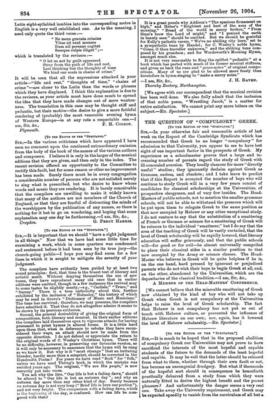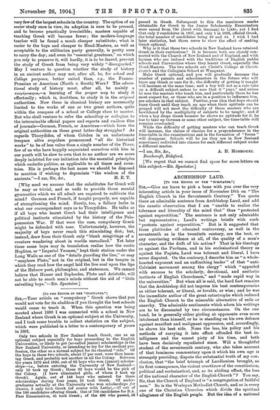is much to be hoped that in the proposed abolition
of compulsory Greek our Universities may not prove to have sacrificed the interests of the most hopeful and capable students of the future to the demands of the least hopeful and capable. It may be well that the latter should be released from what to them, whether through their own fault or not, has become an uncongenial drudgery. But what if thousands of the hopeful sort should in consequence be henceforth practically debarred from a study from which they were naturally fitted to derive the highest benefit and the purest pleasure ? And unfortunately the danger seems a very real one. Take away the University requirement, and Greek may be expected speedily to vanish from the curriculum of all but a
very few of the largest schools in the country. The option of an easier study once in view, its adoption is sure to be pressed, and to become practically irresistible; masters capable of teaching Greek will become fewer; the modern-language teacher will be found a much cheaper substitute ; what is easier to the boys and cheaper to Head-Masters, as well as acceptable to the utilitarian party generally, is pretty sure to carry the day; and even its "essential greatness," on which you rely to preserve it, will hardly, it is to be feared, prevent the study of Greek from being very widely " disregarded." May I venture to question whether the study of history in an ancient author may not, after all, be, for school and College purposes, better suited than, e.g., the Franco- Prussian or American (North v. South) Wars P The educa- tional study of history must, after all, be mainly a rpoysip.mozopec,—a learning of the proper way to study it effectually ; which is, doubtless, to study it in the original authorities. Now these in classical history are necessarily limited to the works of one or two great authors, quite within the compass of a school or College class to master. But who shall venture to refer the schoolboy or collegian to the interminable official papers and reports and endless files of journals—German, French, or American—which form the original authorities on these great latter-day struggles P As regards Thucydides, of whom Cobden in an unfortunate trespass ultra crepidam pronounced "all the historical works" to be of less value than a single number of the Times, few of us who have happily acquainted ourselves with him in our youth will be slow to own that to no author are we more deeply indebted for our initiation into the essential principles which underlie politics, as applicable to all times and coun- tries. His is perhaps the last name we should be disposed to mention if wishing to depreciate "the wisdom of the
ancients."—I am, Sir, &c., H. E. T.
[Why need we assume that the substitutes for Greek will be easy or trivial, and so unfit to provide those mental gymnastics which we all admit are required to cultivate the mind? German and French, if taught properly, are capable of strengthening the mind. Surely, too, a fallacy lurks in what our correspondent says as to Thucydides. He talks as if all boys who learnt Greek had their intelligence and political instincts stimulated by the history of the Pelo- ponnesian War. If that were the case, compulsory Greek might be defended with ease. Unfortunately, however, the majority of boys never reach this stimulating diet; but, instead, draw from their Greek only "blank misgivings of a creature wandering about in worlds unrealised." Yet later these same boys may in translation realise how the rustic Hoplites, or "Imperial Yeomen," kept their station under the Long Walls as one of the " details guarding the line," or may " unsphere Plato," not in the original, but in the tongue in which they read how the angel laid the live coal upon the lips of the Hebrew poet, philosopher, and statesman. We cannot believe that Homer and Sophocles, Plato and Aristotle, will not be able to reach men's minds without the aid of " little snivelling boys."—En. Spectator.] MO THE EDITOR OF TIM “speari.Tos...















































 Previous page
Previous page